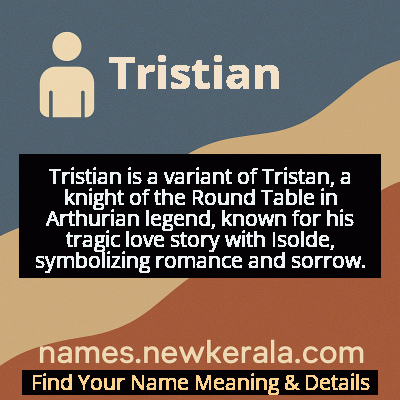Tristian Name Meaning & Details
Origin, Popularity, Numerology Analysis & Name Meaning of Tristian
Discover the origin, meaning, and cultural significance of the name TRISTIAN. Delve into its historical roots and explore the lasting impact it has had on communities and traditions.
Name
Tristian
Gender
Male
Origin
Arthurian
Lucky Number
2
Meaning of the Name - Tristian
Tristian is a variant of Tristan, a knight of the Round Table in Arthurian legend, known for his tragic love story with Isolde, symbolizing romance and sorrow.
Tristian - Complete Numerology Analysis
Your Numerology Number
Based on Pythagorean Numerology System
Ruling Planet
Moon
Positive Nature
Diplomatic, friendly, artistic, empathetic.
Negative Traits
Over-sensitive, moody, indecisive, prone to self-pity.
Lucky Colours
Green, cream, white.
Lucky Days
Monday.
Lucky Stones
Pearl, moonstone.
Harmony Numbers
1, 3, 4.
Best Suited Professions
Diplomats, mediators, caregivers, artists.
What People Like About You
Cooperative spirit, friendliness, artistic talent.
Famous People Named Tristian
Tristan (Legendary)
Knight of the Round Table
Central figure in Tristan and Iseult romance, known for his tragic love story and chivalric deeds
Tristan Tzara
Poet and Performance Artist
Founder of Dadaism, revolutionary art movement that challenged conventional artistic norms
Tristan Thompson
Professional Basketball Player
NBA champion with Cleveland Cavaliers, known for defensive prowess and rebounding skills
Tristan Wilds
Actor and Singer
Starred in 'The Wire' and '90210', recognized for breakthrough performances in television drama
Name Variations & International Equivalents
Click on blue names to explore their detailed meanings. Gray names with will be available soon.
Cultural & Historical Significance
In Arthurian tradition, Tristan (often spelled Tristian in some variants) served as a Knight of the Round Table renowned for his musical talent, swordsmanship, and ultimately, his doomed love for Iseult, the wife of his uncle King Mark. The story's cultural impact extends beyond medieval literature into opera (Wagner's 'Tristan und Isolde'), poetry, and modern adaptations, establishing the name as synonymous with passionate, ill-fated romance and noble suffering. The character embodies the conflict between personal desire and social obligation that continues to speak to contemporary audiences about the complexities of human relationships.
The name's evolution through various cultures—from Celtic origins to French romances to English adaptations—demonstrates how stories transform across borders while retaining their core emotional power. Tristian represents not just a literary character but an archetype of the tortured romantic hero that has influenced countless subsequent love stories in Western culture.
Extended Personality Analysis
Individuals named Tristian are often perceived as possessing a complex blend of romantic idealism and practical resilience. Drawing from the name's legendary associations, they tend to be passionate, deeply emotional, and artistically inclined, with a strong sense of loyalty to those they care about. Many Tristians exhibit creative talents, particularly in music, writing, or visual arts, reflecting the legendary Tristan's proficiency as a harpist and poet. They often approach relationships with intensity and devotion, though may struggle with the tension between their personal desires and external responsibilities.
Beyond the romantic associations, Tristians typically demonstrate courage, intelligence, and problem-solving abilities. Like their Arthurian namesake who overcame numerous challenges—from slaying the Irish champion Morholt to navigating political intrigues—modern Tristians often show determination in facing obstacles. They tend to be introspective individuals who value deep connections over superficial relationships, and while they may experience emotional turbulence, they usually develop strong coping mechanisms and emotional intelligence. The name suggests someone who feels deeply but learns to channel those feelings into creative or constructive outlets.
In social settings, Tristians often display a magnetic quality that draws people to them, combined with a certain melancholy or depth that makes them memorable. They're frequently described as 'old souls' who understand life's complexities at a young age. While they can be prone to dramatic mood swings or periods of introspection, they generally maintain a core of integrity and honor that guides their decisions, much like their legendary counterpart navigating the treacherous waters of courtly love and feudal obligation.
Modern Usage & Popularity
In contemporary naming practices, Tristian maintains steady popularity as a distinctive alternative to the more common Tristan spelling. While never reaching the top 100 names in most English-speaking countries, it consistently appears in birth registries, particularly among parents seeking names with literary and historical resonance without being overly common. The name enjoys particular popularity in the United States, United Kingdom, Canada, and Australia, where Arthurian names have experienced a revival alongside medieval-inspired naming trends. According to Social Security Administration data, Tristan (including Tristian variations) ranked around #100-150 in popularity throughout the 2010s, with Tristian specifically representing approximately 15% of Tristan-name births. The name appeals to parents who appreciate its romantic connotations while preferring the phonetic clarity of the 'ian' ending over the more ambiguous 'an' ending of Tristan. Recent years have seen increased usage among parents drawn to names that sound both classic and distinctive, with the added benefit of rich cultural and literary associations that provide built-in storytelling opportunities.
Symbolic & Spiritual Meanings
Symbolically, Tristian represents the eternal human struggle between passion and duty, love and honor, personal desire and social obligation. The name embodies the concept of 'the tragic hero'—someone fundamentally noble whose greatest strengths become their ultimate downfall. Metaphorically, it speaks to the idea that our deepest loves and most profound connections often come with corresponding sacrifices and complications. The name also carries symbolism related to musicality and artistic expression, hearkening back to the legendary Tristan's skill with the harp, suggesting that beauty often emerges from sorrow and that creative expression can transform pain into something meaningful. In broader terms, Tristian symbolizes the journey of emotional maturation—learning to navigate intense feelings while maintaining personal integrity and resilience in the face of life's inevitable challenges and heartbreaks. The name serves as a reminder that human experience is inherently complex, that love and loss are often intertwined, and that true character is revealed not in avoiding suffering but in how one responds to it with grace, creativity, and continued capacity for connection despite past wounds.

